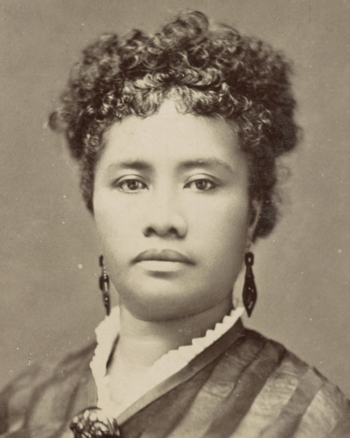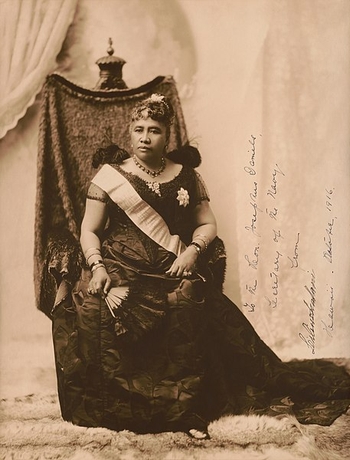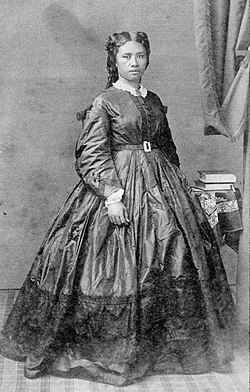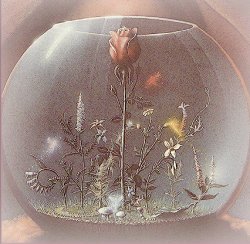
The creative queen who was a talented composer. Her nation was overthrown, and she was imprisoned when she resisted. The nation later became the state Hawaii. |
 Lili’uokalani (September 2, 1838 – November 11, 1917) was the only queen regnant and the last sovereign monarch of the Hawaiian Kingdom, ruling from January 29, 1891, until the overthrow of the Hawaiian Kingdom on January 17, 1893.
Lili’uokalani (September 2, 1838 – November 11, 1917) was the only queen regnant and the last sovereign monarch of the Hawaiian Kingdom, ruling from January 29, 1891, until the overthrow of the Hawaiian Kingdom on January 17, 1893.
The composer of the famous song "Aloha Oe" and numerous other works, she wrote her autobiography "Hawaii's Story by Hawaii's Queen" during her imprisonment following the overthrow.
Lili’uokalani. ascended to the throne on January 29, 1891, nine days after her brother's death.
The overthrow of the Hawaiian Kingdom was a result of progressive governmental control by foreigners and their descendants who were coming in increasing numbers to the islands of Hawaii. Many of these foreigners bought Hawaiian land and invested in the lucrative Hawaiian sugar industry. In 1887, these men forced the then reigning king, Kalakaua, to sign the so-called "Bayonet Constitution", which stripped him of much of his power, in turn creating a constitutional monarchy. In 1890, the United States enacted the McKinley Tariff; the new law sharply raised the country's import tariffs, ending the Hawaiian sugar industry's dominance in the North American market and depressing prices, pushing Hawaii into turmoil.
Following the sugar crash, in 1893 the reigning Queen Lili'uokalani proposed a new constitution to replace the 1887 one. If adopted, the new constitution would revoke many of the foreigners' powers, and put the queen back in control of the Kingdom. The proposal was backed by the majority of the native population; however, it was naturally opposed by the Americans and other foreigners. Hoping for American intervention, they began planning a coup. Anti-monarchists coalesced, forming the Committee of Safety while royalist leaders formed the Committee of Law and Order in support of the queen and the government. The situation soon escalated as both sides armed themselves. Fearing for American safety, the United States called on USS Boston to land a small force of Marines to protect American interests. Although the Americans were sworn to neutrality and never fired a shot, they did intimidate the royalist defenders, and Queen Lili'uokalani, fearing bloodshed, conceded.
 The coup d'état established the Republic of Hawaii, but the ultimate goal was the annexation of the islands to the United States, which was temporarily blocked by President Grover Cleveland. After an unsuccessful uprising to restore the monarchy, the oligarchical government placed the former queen under house arrest at the Iolani Palace. On January 24, 1895, Lili’uokalani. was forced to abdicate the Hawaiian throne, officially ending the deposed monarchy. Attempts were made to restore the monarchy and oppose annexation, but with the outbreak of the Spanish–American War, the United States annexed Hawaii. Living out the remainder of her later life as a private citizen, Lili’uokalani. died at her residence, Washington Place, in Honolulu.
The coup d'état established the Republic of Hawaii, but the ultimate goal was the annexation of the islands to the United States, which was temporarily blocked by President Grover Cleveland. After an unsuccessful uprising to restore the monarchy, the oligarchical government placed the former queen under house arrest at the Iolani Palace. On January 24, 1895, Lili’uokalani. was forced to abdicate the Hawaiian throne, officially ending the deposed monarchy. Attempts were made to restore the monarchy and oppose annexation, but with the outbreak of the Spanish–American War, the United States annexed Hawaii. Living out the remainder of her later life as a private citizen, Lili’uokalani. died at her residence, Washington Place, in Honolulu.
Lili'uokalani was an accomplished author and songwriter. Her book Hawaii's Story by Hawaii's Queen gave her view of the history of her country and her overthrow. She is said to have played guitar, piano, organ, ukulele and zither, and also sang alto, performing Hawaiian and English sacred and secular music In her memoirs she wrote:
"To compose was as natural to me as to breathe; and this gift of nature, never having been suffered to fall into disuse, remains a source of the greatest consolation to this day.[…] Hours of which it is not yet in place to speak, which I might have found long and lonely, passed quickly and cheerfully by, occupied and soothed by the expression of my thoughts in music."
King Kamehameha wanted to replace the merely translated British anthem by a song with a truly Hawaiian background. The new song “He Mele Lahui Hawaii” (“The Song of the Hawaiian Nation”) was composed in 1866 by queen Lili’uokalani, the first of two known Hawaiian national anthems.
Lili'uokalani helped preserve key elements of Hawaii's traditional poetics while mixing in Western harmonies brought by the missionaries. A compilation of her works, titled The Queen's Songbook, was published in 1999 by the Queen Lili'uokalani Trust. Lili'uokalani used her musical compositions as a way to express her feelings for her people, her country, and what was happening in the political realm in Hawaii. One example of the way her music reflected her political views is her translation of the Kumulipo, the Hawaiian creation chant passed down orally by her great grandmother Alapaiwahine. While under house arrest, Lili'uokalani feared she would never leave the palace alive, so she translated the Kumulipo in hopes that the history and culture of her people would never be lost. The ancient chants record her family's genealogy back to the origin story of Hawaii.
After Lili'uokalani was imprisoned in the Iolani Palace, she was denied literature and newspapers, essentially cutting her off from her people, but she continued to compose music with paper and pencil while she was in confinement. Another of her compositions was "Aloha Oe", a song she had written previously and transcribed during her confinement. In her writings, she says,
"At first I had no instrument, and had to transcribe the notes by voice alone; but I found, notwithstanding disadvantages, great consolation in composing, and transcribed a number of songs. Three found their way from my prison to the city of Chicago, where they were printed, among them the 'Aloha Oe' or 'Farewell to Thee', which became a very popular song."
Originally written as a lover's good-bye, the song came to be regarded as a symbol of, and lament for, the loss of her country. Today, it is one of the most recognizable Hawaiian songs
King Kamehameha V wanted to replace the merely translated British anthem by a song with a truly Hawaiian background. The new song “He Mele Lahui Hawaii” (“The Song of the Hawaiian Nation”) was composed in 1866 by queen Lili’uokalani.
(Note - The above writing was excerpted from wikipedia web pages)
|
Explore - The Amaranth Publishing web pages  including the music of the spheres, the music of a Renaissance alchemist, music created by software and artificial intelligence, the music of the fairies, the music of the Illuminati, the world's most mysterious book, the world's oldest song, a way you can compose music like Mozart, the world's oldest love song, including the music of the spheres, the music of a Renaissance alchemist, music created by software and artificial intelligence, the music of the fairies, the music of the Illuminati, the world's most mysterious book, the world's oldest song, a way you can compose music like Mozart, the world's oldest love song, and much more........ |
|---|
 1. Sheet Music
1. Sheet Music


